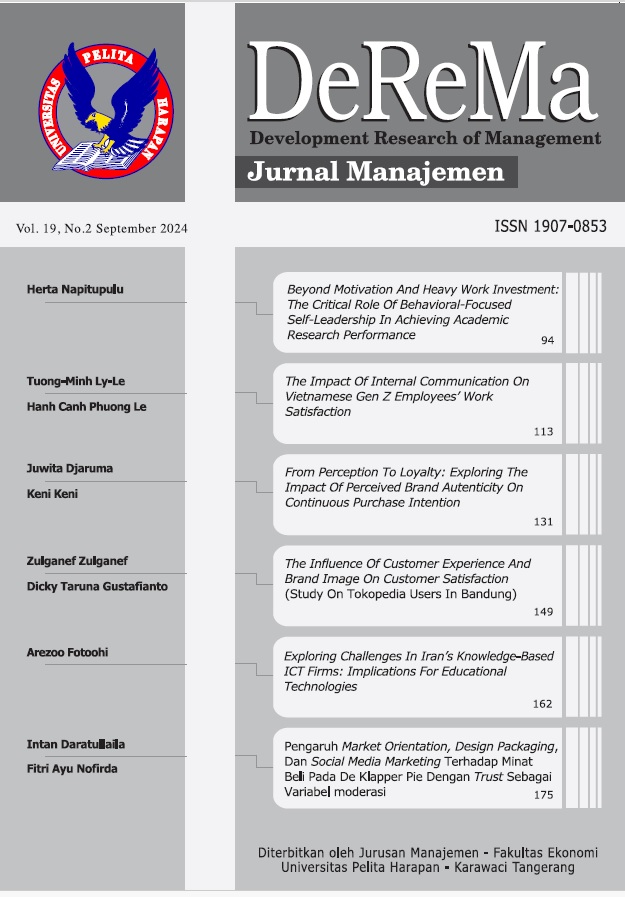THE IMPACT OF INTERNAL COMMUNICATION ON VIETNAMESE GEN Z EMPLOYEES’ WORK SATISFACTION
DOI:
https://doi.org/10.19166/derema.v19i2.8165Keywords:
internal communication, Employee satisfaction, Gen Z, VietnamAbstract
This study aims to explore how effective internal communication influences the job satisfaction of Vietnamese Gen Z employees, and to understand whether good internal communication can enhance Gen Z employees’ comprehension of their job roles, promotion opportunities, relationships with supervisors, and co-worker interactions, ultimately leading to increased job satisfaction.The research comprises two phases: a pilot survey and in-depth interviews. The pilot survey confirmed the importance of internal communication and its perceived influence on job satisfaction. Subsequently, in-depth interviews provided nuanced insights into how internal communication practices affect their understanding of work nature, promotion opportunities, relationships with supervisors, and co-workers.The findings indicate that effective internal communication positively affects Gen Z employees’ understanding of their job roles, increases their awareness of training and promotion opportunities, enhances relationships with supervisors, and fosters productive co-worker interactions. While it did not directly influence salary levels, these internal communication efforts significantly improved job satisfaction.
Abstrak dalam Bahasa Indonesia. Penelitian ini bertujuan untuk mengeksplorasi bagaimana komunikasi internal yang efektif mempengaruhi kepuasan kerja karyawan Gen Z di Vietnam, dan untuk memahami apakah komunikasi internal yang baik dapat meningkatkan pemahaman karyawan Gen Z tentang peran pekerjaan mereka, peluang promosi, hubungan dengan atasan, dan interaksi dengan rekan kerja, yang pada akhirnya meningkatkan kepuasan kerja. Penelitian ini terdiri dari dua fase: survei pendahuluan dan wawancara mendalam. Survei pendahuluan mengonfirmasi pentingnya komunikasi internal dan pengaruhnya terhadap kepuasan kerja yang dirasakan. Selanjutnya, wawancara mendalam memberikan wawasan yang lebih mendetail tentang bagaimana praktik komunikasi internal memengaruhi pemahaman mereka tentang sifat pekerjaan, peluang promosi, hubungan dengan atasan, dan rekan kerja. Temuan menunjukkan bahwa komunikasi internal yang efektif secara positif mempengaruhi pemahaman karyawan Gen Z tentang peran pekerjaan mereka, meningkatkan kesadaran mereka tentang peluang pelatihan dan promosi, memperbaiki hubungan dengan atasan, dan mendorong interaksi yang produktif dengan rekan kerja. Meskipun tidak secara langsung mempengaruhi tingkat gaji, upaya komunikasi internal ini secara signifikan meningkatkan kepuasan kerja.
References
Aggarwal, A., Sadhna, P., Gupta, S., Mittal, A., & Rastogi, S. (2020). Gen Z entering the workforce: Restructuring HR policies and practices for fostering the task performance and organizational commitment. Journal of Public Affairs, e2535. https://doi.org/10.1002/pa.2535
Blau, P. M. (1964). Exchange and power in social life. New York: John Wiley & Sons.
Bozeman, B., & Gaughan, M. (2011). Job satisfaction among university faculty: Individual, work, and institutional determinants. The Journal of Higher Education, 82(2), 154-186. https://doi.org/10.1080/00221546.2011.11779090
Byrne, Z. S., & LeMay, E. (2006). Different media for organizational communication: Perceptions of quality and satisfaction. Journal of Business and Psychology, 21, 149-173. https://doi.org/10.1007/s10869-006-9023-8
Cakmak, E., Öztekin, Ö., & Karadağ, E. (2015). The effect of leadership on job satisfaction. In E. Karadağ (Ed.), Leadership and organizational outcomes (29-56). Springer, Cham. https://doi.org/10.1007/978-3-319-14908-0_3
Do, D. A., Doan, Q. D., Vu, L. K., Le, T. T., Tran, N. M., & Nguyen, G. L. (2023). Antecedents of turnover intention among Gen z in Vietnam: The mediating role of affective commitment. Cogent Business & Management, 10(3), 2267811. https://doi.org/10.1080/23311975.2023.2267811
Duong, T. H. N., & Tran, M. L. (2021). Identifying work-related factors influencing job satisfaction using job descriptive index questionnaire: a study of IT companies in Hanoi. Journal of International Economics and Management, 21(1), 63-85. https://doi.org/10.38203/jiem.021.1.0023
Äurović, M., Dramićanin, S., & Milenković, D. (2023). Generation X, Y and Z: Impact of internal communication on employee satisfaction and commitment. BizInfo (Blace) Journal of Economics, Management and Informatics, 14(2), 11-19. https://doi.org/10.5937/bizinfo2302011D
Ewing, M., Men, L. R., & O’Neil, J. (2019). Using social media to engage employees: Insights from internal communication managers. International Journal of Strategic Communication, 13(2), 110-132. https://doi.org/10.1080/1553118X.2019.1575830
Hackman, J. R., & Oldham, G. R. (1976). Motivation through the design of work: Test of a theory. Organizational Behavior and Human Performance, 16, 250-279. https://doi.org/10.1016/0030-5073(76)90016-7
Jo, S., & Shim, S. W. (2005). Paradigm shift of employee communication: The effect of management communication on trusting relationships. Public Relations Review, 31(2), 277-280. https://doi.org/10.1016/j.pubrev.2005.02.012
Kang, M. & Sung, M. (2017). How symmetrical employee communication leads to employee engagement and positive employee communication behaviors: The mediation of employee-organization relationships. Journal of Communication Management, 21(1), 82-102. https://doi.org/10.1108/JCOM-04-2016-0026
Karanges, E., Johnston, K., Beatson, A., & Lings, I. (2015). The influence of internal communication on employee engagement: A pilot study. Public Relations Review, 41(1), 129-131. https://doi.org/10.1016/j.pubrev.2014.12.003
Kim, J. N., & Rhee, Y. (2011). Strategic thinking about employee communication behavior (ECB) in public relations: Testing the models of megaphoning and scouting effects in Korea. Journal of Public Relations Research, 23(3), 243-268. https://doi.org/10.1080/1062726X.2011.582204
Landy, F. J., Shankster, L. J., & Kohler, S. S. (1994). Personnel selection and placement. Annual Review of Psychology, 45(1), 261-296. https://doi.org/10.1146/annurev.ps.45.020194.001401
Lee, Y., & Dong, E. (2023). How transparent internal communication from CEO, supervisors, and peers leads to employee advocacy. Management Communication Quarterly, 37(4), 878-912. https://doi.org/10.1177/08933189231153869
Lemon, L. L. (2019). The employee experience: How employees make meaning of employee engagement. Journal of Public Relations Research, 31(5-6), 176-199. https://doi.org/10.1080/1062726X.2019.1704288
Li, J. Y., Sun, R., Tao, W., & Lee, Y. (2021). Employee coping with organizational change in the face of a pandemic: The role of transparent internal communication. Public Relations Review, 47(1), 101984. https://doi.org/10.1016/j.pubrev.2020.101984
Meechan, N., & Wonglorsaichon, P. (2024). The influence of working environment on burnout among Gen-X, Gen-Y, and Gen-Z employees. Journal of Family Business & Management Studies, 16(1). https://www.fbmsjournal.com/wp-content/uploads/2023/06/Draft-The-Influence-of-Working-Environment-on-Burnout-Gen-X-Gen-Y-and-Gen-Z-Employees.pdf
Men, L. R., & Yue, C. A. (2019). Creating a positive emotional culture: Effect of internal communication and impact on employee supportive behaviors. Public Relations Review, 45(3), 101764. https://doi.org/10.1016/j.pubrev.2019.03.001
Meng, J., & Berger, B. K. (2019). The impact of organizational culture and leadership performance on PR professionals’ job satisfaction: Testing the joint mediating effects of engagement and trust. Public Relations Review, 45(1), 64-75. https://doi.org/10.1016/j.pubrev.2018.11.002
Mishra, K., Boynton, L., & Mishra, A. (2014). Driving employee engagement: The expanded role of internal communications. International Journal of Business Communication, 51(2), 183-202. https://doi.org/10.1177/2329488414525399
Nauman, S., Bhatti, S., Jalil, F., & Bint E Riaz, M. (2021). How training at work influences employees’ job satisfaction: roles of affective commitment and job performance. International Journal of Training Research, 19(1), 61-76. https://doi.org/10.1080/14480220.2020.1864444
Nguyen, M. H., & Ngo, V. M. (2021). Employees’ psychological capital, burnout, and quality of work-life in Vietnamese enterprises: Moderating effects of individual and organisational characteristics. Asian Academy of Management Journal, 26(1), 89-112. https://doi.org/10.21315/aamj2021.26.1.4
Nguyen Ngoc, T., Viet Dung, M., Rowley, C., & Pejić Bach, M. (2022). Generation Z job seekers’ expectations and their job pursuit intention: Evidence from transition and emerging economy. International Journal of Engineering Business Management, 14, 18479790221112548. https://doi.org/10.1177/18479790221112548
PwC Vietnam. (2021). How digital ready is Generation Z?. https://www.pwc.com/vn/en/publications/vietnam-publications/digital-readiness-gen-z.html
Qin, Y. S., & Men, L. R. (2022). Exploring the impact of internal communication on employee psychological well-being during the COVID-19 pandemic: The mediating role of employee organizational trust. International Journal of Business Communication, 60(4), 1197-1219. https://doi.org/10.1177/23294884221081838
Rahayu, M., Rasid, F., & Tannady, H. (2019). The effect of career training and development on job satisfaction and its implications for the organizational commitment of regional secretariat (SETDA) employees of Jambi provincial government. International Review of Management and Marketing, 9(1), 79. https://www.econjournals.com/index.php/irmm/article/view/7439
Rawabdeh, M., & Nawafleh, S. (2019). Compensation system and job satisfaction: the application of the job descriptive index in the public-sector of Jordan. International Journal of Productivity and Quality Management, 28(3), 299-317. https://doi.org/10.1504/IJPQM.2019.103523
Rue, P. (2018). Make way, millennials, here comes Gen Z. About Campus, 23(3), 5-12.
Smith, P. C., Kendall, L., & Hulin, C. L. (1969). The measurement of satisfaction in work and retirement: A strategy for the study of attitudes. Rand McNally.
Tasios, T., & Giannouli, V. (2017). Job descriptive index (JDI): Reliability and validity study in Greece. Archives of Assessment Psychology, 7(1), 31-61.
Teevan, J., Baym, N., Butler, J., Hecht, B., Jaffe, S., Nowak, K., Sellen, A., Yang, L., Ash, M., Awori, K., Bruch, M., Choudhury, P., Coleman, A., Counts, S., Cupala, S., Czerwinski, M., Doran, E., Fetterolf, E., Franco, M., G., ... Yang, L. (2022). Microsoft new future of work report 2022. Microsoft Research Tech Report MSR-TR-2022-3. https://www.microsoft.com/en-us/research/uploads/prod/2022/04/Microsoft-New-Future-Of-Work-Report-2022.pdf
Tessema, M. T., Tesfom, G., Faircloth, M. A., Tesfagiorgis, M., & Teckle, P. (2022). The “great resignation”: Causes, consequences, and creative HR management strategies. Journal of Human Resource and Sustainability Studies, 10(1), 161-178. https://doi.org/10.4236/jhrss.2022.101011
Vasquez, D. (2014). Employee retention for economic stabilization: A qualitative phenomenological study in the hospitality sector. International Journal of Management, Economics and Social Sciences, 3(1), 1-17. https://papers.ssrn.com/sol3/papers.cfm?abstract_id=2409917
VerÄiÄ, A. T., & Vokić, N. P. (2017). Engaging employees through internal communication. Public Relations Review, 43(5), 885-893. https://doi.org/10.1016/j.pubrev.2017.04.005
Welch, M., & Jackson, P. R. (2007). Rethinking internal communication: a stakeholder approach. Corporate Communications: An International Journal, 12(2), 177-198. https://doi.org/10.1108/13563280710744847
Downloads
Published
Issue
Section
License
Authors who publish with this journal agree to the following terms:
1) Authors retain copyright and grant the journal right of first publication with the work simultaneously licensed under a Creative Commons Attribution License (CC-BY-SA 4.0) that allows others to share the work with an acknowledgement of the work's authorship and initial publication in this journal.
2) Authors are able to enter into separate, additional contractual arrangements for the non-exclusive distribution of the journal's published version of the work (e.g., post it to an institutional repository or publish it in a book), with an acknowledgement of its initial publication in this journal.
3) Authors are permitted and encouraged to post their work online (e.g., in institutional repositories or on their website). The final published PDF should be used and bibliographic details that credit the publication in this journal should be included.





